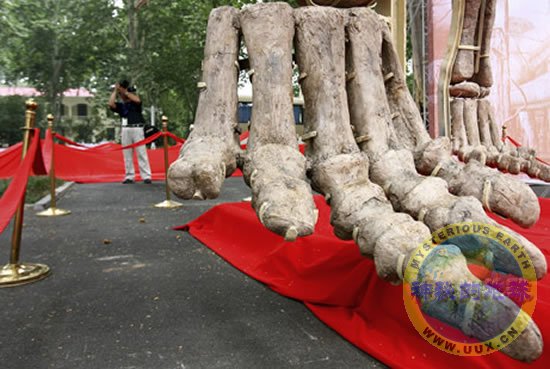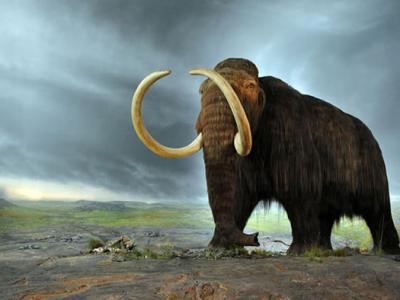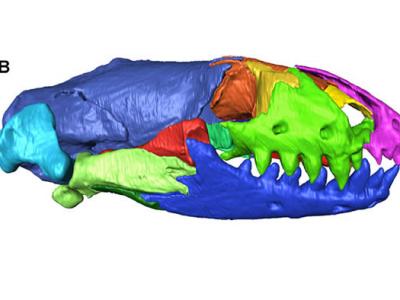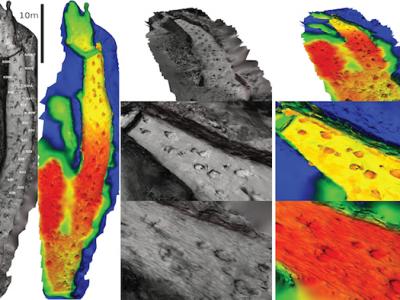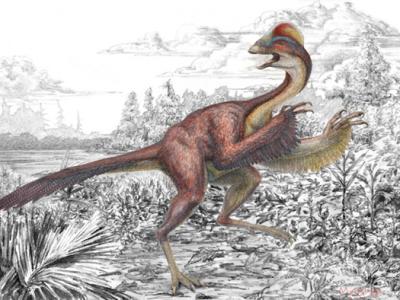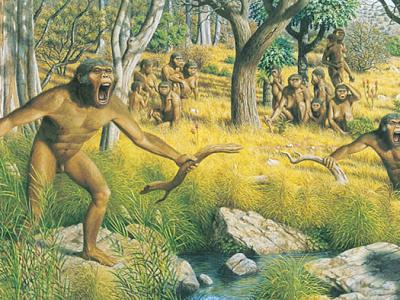Dino Black Market Fuels Peasant-Police Combat in China
Parts of this hundred-million-year-old dinosaur, photographed on July 3, 2007, were crushed into powder by villagers in China's central Shaping village for use in an elixir.
Chinese peasants are increasingly digging up valuable dinosaur fossils in a bid to escape poverty, experts say.
Photograph by Donald Chan/Reuters
Kevin Holden Platt in Beijing
for National Geographic News
November 27, 2007
Armed with only tractors and farm tools, Chinese peasants recently attacked police who had come to seize dinosaur bones the farmers had found.
The clash called attention to the rise of a new type of dinosaur hunter in China's fossil-rich countryside: the "peasant paleontologist."
The rebellion also set in motion the first court test of a 2006 Chinese law banning "unauthorized" excavation, possession, sale, and export of dinosaur fossils. Offenders are subject to lengthy prison terms or, in serious cases, the death penalty.
The seven defendants—peasants from Shaping village in central Henan Province—are accused of forcibly resisting government orders to hand over a cache of hundred-million-year-old dinosaur bones they discovered.
(See a map of China.)
Dinosaur Protection Squad
Some Shaping villagers have donated their fossil finds to scientists. But others have resisted, even though officials have pasted posters throughout Shaping announcing the ban on the possession and sale of dinosaur relics.
Officials eventually tried to seize all dinosaur fossils from the villagers, without offering any compensation.
According to court documents made public on China's government-run judicial news portal, www.chinacourt.org, the seven defendants helped organize a "Dinosaur Protection Squad" to safeguard Shaping's fossils against seizure.
Civilian sentinels patrolled the perimeter of the village around the clock. When sentries spotted police or local officials who aimed to seize the fossils, they set off fireworks to alert the community, China Court reported.
When a contingent of government and security officials attempted to enter Shaping in March, the protection squad deployed villagers as a human barricade and even seized some of the police cars.
When more officials arrived a week later, the villagers fought back with their farm equipment.
After a drawn-out skirmish, police finally took the seven "ringleaders" by force.
The authorities have recovered most of the dinosaur fossils that were at the center of the case, according to an official for the People's Court who wished to remain anonymous due to fear of getting in trouble with the government.
He added the "Dino Seven" face imminent trial on the relatively minor criminal charge of obstructing justice, which is punishable by up to three years imprisonment.
Official reports on the case provided no coverage of the detainees' version of events or of any defense to the charges.
It's not the first time Shaping's dinosaur hunters have made headlines.
Last July, Shaping residents gained fame for making a mystical "dragon bone" elixir, which scientists determined included the crushed remnants of a massive herbivore that measured more than 60 feet (20 meters) from head to tail.
Escape From Poverty?
Xu Xing, one of China's top dinosaur hunters, said it's unclear if the villagers knew that independent fossil excavations had recently been criminalized.
There are no statistics on how many fossils have been taken by peasants, said Xu, of the Institute of Vertebrate Paleontology and Paleoanthropology in Beijing.
In northeastern Liaoning province, where Xu discovered the miniature four-winged dinosaur Microraptor gui, "a high percentage of the farmers in the area have taken part in amateur dinosaur digs," he said.
"If all of the peasants who have engaged in unapproved dinosaur excavations were caught, tried and jailed, China would not have enough prisons to hold them all," Xu said.
Many of these peasant paleontologists hope to sell dinosaur fossils to escape a life of subsistence farming, he said.
David Eberth, a paleontologist at the Royal Tyrrell Museum in Alberta, Canada, has participated in dinosaur digs in China for nearly two decades.
"The skyrocketing financial value of high-quality dinosaur fossils worldwide" might be inadvertently providing incentives for a burgeoning black market trade in fossils, Eberth said.
Chinese legislators are now holding discussions with paleontologists about rewriting the law surrounding dinosaur digs.
Xu said legislators would be wise to include a system of rewards for amateur fossil finders, rather than relying solely on punishments for failing to relinquish finds.
Social Unrest
The Shaping villagers who staged high-risk protests to protect their horde of dinosaur fossils are likely part of a trend toward increased resistance to state laws perceived as unjust, experts say.
Most Chinese who protest don't believe they stand a fair chance in conflicts with the state, said Thomas Lum, Asian-affairs specialist with the Congressional Research Service in Washington, D.C.
In an effort to reduce tensions that periodically erupt across the Chinese countryside, the government has pushed new policies to ease rural poverty, Lum said.
But it's unclear whether the 80,000 protests officially reported in 2005 have ebbed since then.
Lum also said there should be little suspense over the verdict in the trial of the seven Shaping villagers. In 2004 the conviction rate in China's criminal trials was 98 percent.
